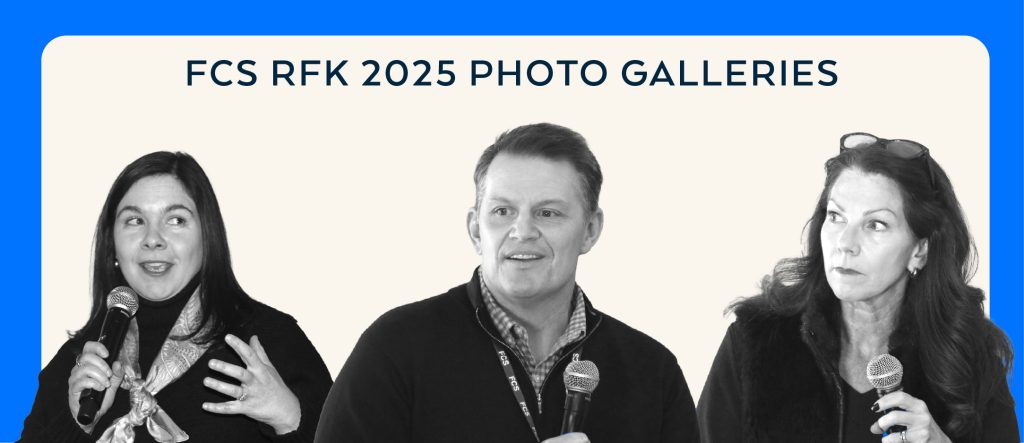by Kevin Windorf, CEO, FCS; CMO, 2112 Communications
Over three days in the picturesque setting of Stowe, Vermont, financial marketing, media, and communications professionals gathered at the 25th Annual FCS RFK Marketing Summit to exchange ideas, share strategies, and set the course for financial marketing in 2025. Alongside the FCS Portfolio Gala, the Summit is a flagship event for the Financial Communications Society, bringing together thought leaders, practitioners, and innovators from across our community. As we learned from this year’s Fireside Forums, the insights from these marketing leaders point to a future defined by bold creativity, strategic technology use, and a renewed focus on education and trust.

The Dynamic Interplay Between Brand and Performance
One of the Summit’s key themes was the complementary nature of brand-building and performance marketing. Gone are the days of viewing these disciplines as competing forces. Today, successful marketers recognize that data-driven performance metrics and creative storytelling must work hand in hand. A presentation on State Street Global Advisors’ “Getting There Starts Here” platform exemplified this synergy, leveraging emotional resonance and rational appeal to connect with diverse audiences.
Collaboration as a Strategic Imperative
Several forum discussions emphasized the evolution of partnerships into collaborative overlays. Unlike traditional transactional relationships, today’s marketing partnerships align shared goals and integrate efforts for long-term impact. Authentic collaborations, such as influencer-driven campaigns and event sponsorships, demonstrate their potential to enhance brand resonance and relevance. This shift encourages marketers to think beyond short-term results and focus on creating meaningful engagement and sustainable connections.
AI: The Indispensable Tool
Not surprisingly, Artificial Intelligence emerged in multiple talks as an essential tool for financial marketers. Whether for audience segmentation, content creation, or real-time insights, AI is no longer a futuristic concept but a daily necessity. Discussions highlighted how AI can provide a deeper understanding of audiences and enable personalized, real-time marketing strategies. However, the human touch remains critical. Marketers must balance AI-driven efficiencies with creativity to maintain authenticity and connection.
The Power of Education
We learned how financial marketers are increasingly turning to education as a cornerstone of their strategies. Simplifying complex products like annuities and fixed income helps build trust and empower consumers. Brands that prioritize clear, educational content can foster deeper relationships and enhance their reputation as trusted advisors. Attendees pointed out that this focus on education aligns with the industry’s broader mission to demystify financial services and make them more accessible.
Content for a Modern Audience
The Summit underscored the transformation of B2B content. Once perceived as dry and uninspired, B2B marketing is now embracing bold creativity, engaging visuals, and innovative storytelling. Financial marketers are adopting a dual approach: thought leadership for depth and snackable formats for quick engagement. Since the COVID-19 pandemic, firms have doubled down on branded content, recognizing its ability to connect with audiences in meaningful ways.
The Measurement Crisis
One of the recurring themes was the industry’s struggle to measure marketing effectiveness. While vanity metrics like impressions and clicks dominate reporting, they fail to capture deeper insights like consideration and intent. Attendees called for a standardized framework that aligns measurement with stakeholder-specific outcomes. This shift is vital to demonstrating ROI and building credibility within organizations.
The Importance of Trust and Reputation
Trust remains a cornerstone of successful financial marketing. Navy Federal Credit Union’s trust metrics, for example, play a central role in assessing brand health and guiding marketing strategies. Reputation management is equally critical, requiring alignment between internal culture and external messaging. When internal teams are motivated and engaged, they become powerful ambassadors for the brand (See Turning Employees into Brand Ambassadors).
Balancing Digital and Offline Strategies
It was noted that 80% of B2B buyers conduct research online before contacting sales, so a strong digital presence is essential. However, discussions at the Summit stressed the importance of balancing digital efforts with offline touchpoints. Tangible, in-person interactions create deeper connections and provide opportunities to reinforce trust and loyalty.
Creativity as a Differentiator
Summit speakers highlighted the value of taking risks and thinking outside the box, celebrating bold, creative campaigns that break through the noise. Visually engaging and emotionally resonant content is no longer optional — it’s essential for capturing audience attention and driving meaningful engagement.
The FCS RFK Marketing Summit reinforced that the future of financial marketing lies at the intersection of innovation and authenticity. By embracing bold creativity, strategic collaboration, and a renewed focus on trust and education, marketers can navigate the complexities of a rapidly evolving landscape and build meaningful, lasting connections with their audiences.
